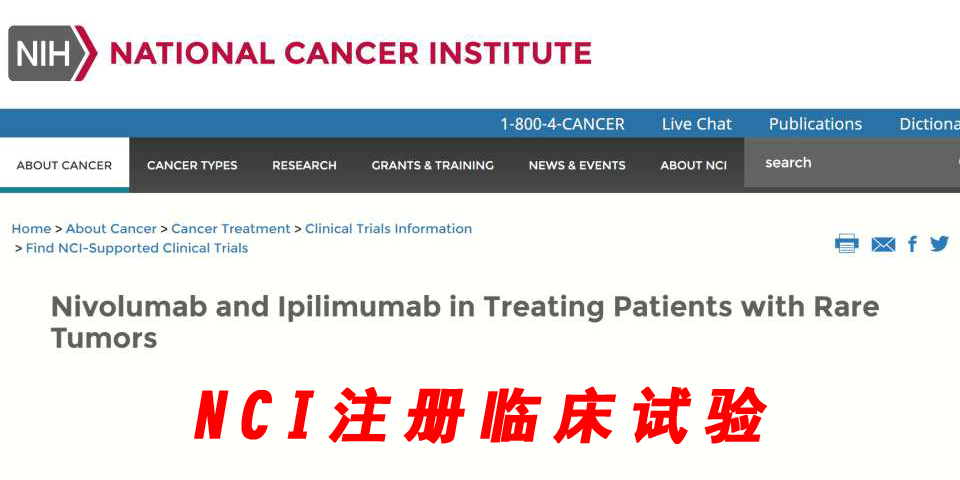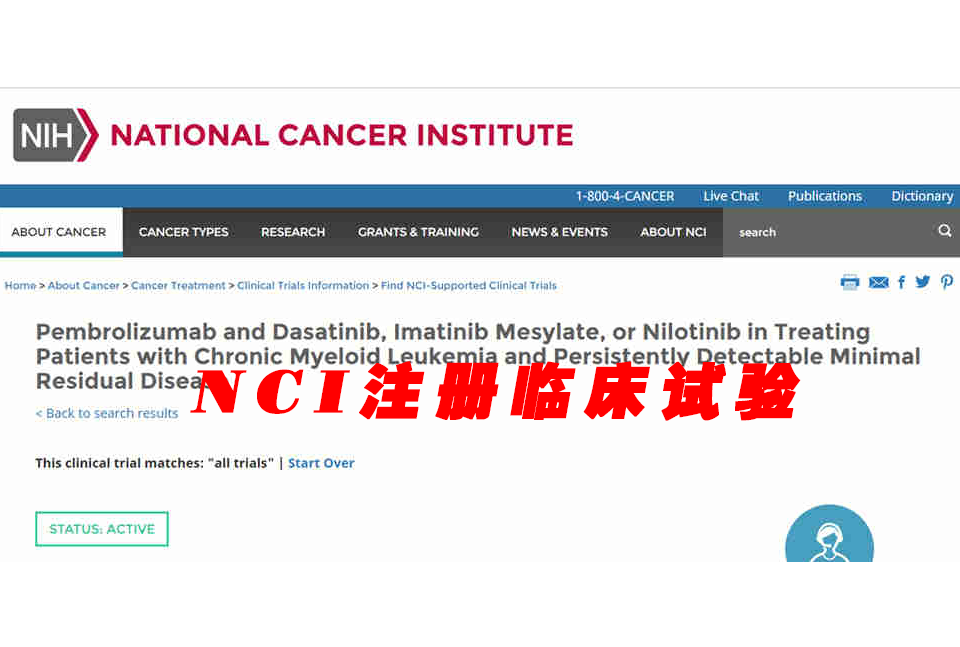- 如有疑问,请联系电邮
- customer@ihealth66.com
最新临床试验:尼洛单抗与伊利单抗治疗罕见肿瘤

约翰·霍普金斯医院(Johns Hopkins Hospital, Baltimore, MD)
2018年11月29日
USNEWS:预防和治疗糖尿病的最佳食物
2018年11月30日This clinical trial studies nivolumab and ipilimumab in treating patients with rare tumors. Monoclonal antibodies, such as nivolumab and ipilimumab, may interfere with the ability of tumor cells to grow and spread. This trial enrolls participants for the following cohorts based on condition: 1. Epithelial tumors of nasal cavity, sinuses, nasopharynx: A) Squamous cell carcinoma with variants of nasal cavity, sinuses, and nasopharynx and trachea (excluding laryngeal, nasopharyngeal cancer [NPC], and squamous cell carcinoma of the head and neck [SCCHN]) B) Adenocarcinoma and variants of nasal cavity, sinuses, and nasopharynx. 2. Epithelial tumors of major salivary glands 3. Salivary gland type tumors of head and neck, lip, esophagus, stomach, trachea and lung, breast and other location 4. Undifferentiated carcinoma of gastrointestinal (GI) tract 5. Adenocarcinoma with variants of small intestine 6. Squamous cell carcinoma with variants of GI tract (stomach small intestine, colon, rectum, pancreas) 7. Fibromixoma and low grade mucinous adenocarcinoma (pseudomixoma peritonei) of the appendix and ovary 8. Rare pancreatic tumors including acinar cell carcinoma, mucinous cystadenocarcinoma or serous cystadenocarcinoma 9. Intrahepatic Cholangiocarcinoma 10. Extrahepatic cholangiocarcinoma and bile duct tumors 11. Sarcomatoid carcinoma of lung 12. Bronchoalveolar carcinoma lung. This condition is now also referred to as adenocarcinoma in situ, minimally invasive adenocarcinoma, lepidic predominant adenocarcinoma, or invasive mucinous adenocarcinoma. 13. Non-epithelial tumors of the ovary: A) Germ cell tumor of ovary B) Mullerian mixed tumor and adenosarcoma 14. Trophoblastic tumor: A) Choriocarcinoma 15. Transitional cell carcinoma other than that of the renal, pelvis, ureter, or bladder 16. Cell tumor of the testes and extragonadal germ tumors: A) Seminoma and testicular sex cord cancer B) Non-seminomatous tumor C) Teratoma with malignant transformation 17. Epithelial tumors of penis – squamous adenocarcinoma cell carcinoma with variants of penis 18. Squamous cell carcinoma variants of the genitourinary (GU) system 19. Spindle cell carcinoma of kidney, pelvis, ureter 20. Adenocarcinoma with variants of GU system (excluding prostate cancer) 21. Odontogenic malignant tumors 22. Endocrine carcinoma of pancreas and digestive tract 23. Neuroendocrine carcinoma including carcinoid of the lung 24. Pheochromocytoma, malignant 25. Paraganglioma 26. Carcinomas of pituitary gland, thyroid gland parathyroid gland and adrenal cortex 27. Desmoid tumors 28. Peripheral nerve sheath tumors and NF1-related tumors 29. Malignant giant cell tumors 30. Chordoma 31. Adrenal cortical tumors 32. Tumor of unknown primary (Cancer of Unknown Primary; CuP) 33. Not Otherwise Categorized (NOC) Rare Tumors [To obtain permission to enroll in the NOC cohort, contact: S1609SC@swog.org] 34. Adenoid cystic carcinoma 35. Vulvar cancer 36. MetaPLASTIC carcinoma (of the breast) 37. Gastrointestinal stromal tumor (GIST)
Status: Active
Age: 18 years and over
Gender: Male or Female
Location: 827 locations
Trial IDs
Secondary IDs NCI-2016-01041
Clinicaltrials.gov ID NCT02834013
本临床试验研究尼伐单抗和依匹莫单抗治疗罕见肿瘤的临床疗效。单克隆抗体,如尼珠单抗和依匹莫单抗,可能干扰肿瘤细胞的生长和扩散能力。本试验基于以下条件招募了参与者:1.鼻腔、鼻窦、鼻咽上皮肿瘤:A)鼻腔、鼻窦、鼻咽和气管变异的鳞状细胞癌(不包括喉癌、鼻咽癌[NPC]和鳞状上皮癌)头颈部癌[SCCHN])B)腺癌和鼻腔、鼻窦和鼻咽的变体。2。主要涎腺上皮性肿瘤3例。Salivary腺型头颈肿瘤、唇、食管、胃、气管和肺、乳腺等部位4例。消化道(GI)未分化癌5例小肠腺癌6例胃肠道(胃、小肠、结肠、直肠、胰腺)鳞状细胞癌7例纤维组织细胞瘤和低度黏液腺癌(腹膜假性瘤)胰腺癌包括腺泡细胞癌、粘液性囊腺癌或浆液性囊腺癌9例,肝内胆管细胞癌10例,肝外胆管癌和胆管癌11例。肺肉瘤样癌12 Bronchoalveolar肺癌这种情况现在也称为原位腺癌、浸润性腺癌、鳞状腺癌、浸润性粘液腺癌。13.卵巢非上皮性肿瘤:A)卵巢生殖细胞瘤B)Mullerian混合瘤和腺肉瘤14。滋养细胞肿瘤:A)绒毛膜癌15。肾、盆腔、输尿管或膀胱以外的过渡细胞癌16。睾丸细胞瘤和性腺外生殖肿瘤s: A)精原细胞瘤和睾丸性索癌B)非精原细胞瘤C)畸胎瘤伴恶性转化17.阴茎上皮性肿瘤-鳞状腺癌细胞癌伴阴茎变异体18.鳞状细胞癌变体泌尿生殖系统(GU)19.梭形细胞车肾、盆腔、输尿管癌20。GU系统变异的腺癌21。牙源性恶性肿瘤22。胰腺和消化道内分泌癌23。神经内分泌癌包括肺类癌24。嗜铬细胞瘤25。副癌胶质瘤26。垂体、甲状腺、甲状旁腺和肾上腺皮质癌27。硬纤维瘤28。周围神经鞘瘤和NF1相关肿瘤29。恶性巨细胞瘤30。脊索瘤31。肾上腺皮质瘤32。不明原发性肿瘤(不明原发性癌;CuP)33。非其他类别(NOC)罕见肿瘤[为了获得加入NOC队列的许可,联系:S1]34例腺样囊性癌35,外阴癌36例。乳房化生性癌(37)胃肠道间质瘤





